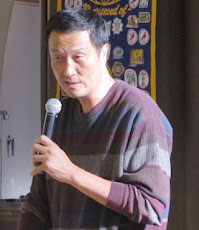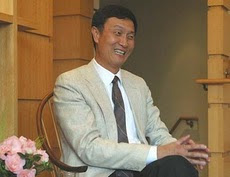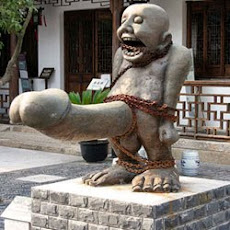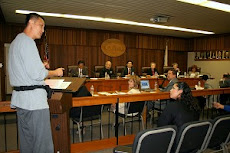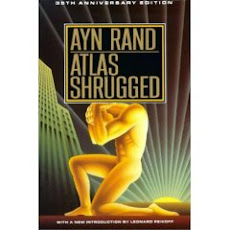 陈凯一语: Kai Chen's Words:
陈凯一语: Kai Chen's Words: 我将Wafa Sultan的演讲与新书的链锁贴在这里,望你们欣赏这个无畏的反传统专制的阿拉伯女性。 她对世界所说的关于反人性的穆斯林传统的分析与否定与我对世界所说的关于反人性的中国传统文化的分析与否定是完全一致的。 对美国自由精神的捍卫与褒扬是我们共同的结论。 我们希望世界都变得像美国,而绝非美国变得像世界其他国家。 --- 陈凯
I paste Wafa Sultan's speech and book links here for all of you to enjoy this brave thinking woman from Syria. Her opposition to her own traditional Muslim (anti-human) pseudo values is parallel to my opposition to my own Chinese traditional (anti-human) pseudo values. Our views about American values we love are also the same. We believe the world should become more like America, not the other way around. --- Kai Chen
 Wafa Sultan Speech Link 演讲链锁:
Wafa Sultan Speech Link 演讲链锁: http://www.youtube.com/watch?v=up3yuQDAWKQ
Wafa Sultan's New Book: 购书链锁
A God Who Hates 仇恨之神
http://www.amazon.com/God-Who-Hates-Courageous-Inflamed/dp/0312538359/ref=sr_1_1?ie=UTF8&s=books&qid=1256925679&sr=1-1
-----------------------------------------------------------
陈凯一语: Kai Chen's Words:
在中国专制官方的庇护允许下发表的书籍刊物都是经过“洗脑部门”筛选过的。 作者们的话要不就是讲一半儿,要不就是有内部政治斗争的因素而“故泄机密”的。 望人们在读袁伟民的“体坛风云”的时候多问多思。 一件事可以肯定: 中共系统现在是一片混乱。 一场残酷的内部权力斗争正在展开。 --- 陈凯
Under the ubiquitous political examination, all the books and publications in China are either all fake or half fake. The authors' words should always be taken with a grain of salt. They either tell half of the story (half truth) or they only reveal certain things under the tutelage of their own party bosses for some political gain over their opponents. When you read Yuan Weimin's book, you should take the same approach. One thing is for sure: China's communist system is in total disarray. A deadly power struggle is well under way. --- Kai Chen
 China calls foul over tell-all sports memoir 袁伟民的书被贬
China calls foul over tell-all sports memoir 袁伟民的书被贬 Yuan Weimin's book includes details of secret deals to get Beijing chosen to host the 2008 Olympic Games. Some have branded him a liar and a traitor, while others applaud his candor.
By Barbara Demick/LA Times
October 31, 2009
Reporting from Beijing - Yuan Weimin was the toast of China's sporting scene from the early 1980s, when he coached the women's gold medal volleyball team, to 2001, when as head of the Chinese Olympic Committee, he helped bring home the biggest prize of all -- Beijing's selection as host city for the 2008 Summer Games. Now the 70-year-old retired cadre is being denounced by some as a liar and a traitor, accused of spilling state secrets and disrupting Chinese harmony.
The offense lies between the covers of his memoir, "Yuan Weimin: Winds and Clouds of the World of Sports," published this month in Beijing.
In the book, so far only available in Chinese, Yuan writes about a deal he says was cut during a cloak-and-dagger meeting in a Geneva hotel room eight years ago in which China promised to support the candidacy of Belgian Jacques Rogge as head of the International Olympic Committee in return for his support of Beijing's Olympic bid.
It was all kept hush-hush because Rogge, as a European representative, couldn't publicly endorse Beijing when two European cities -- Paris and Istanbul -- were also contenders, Yuan writes.
"We had a mutual understanding that we all understood clearly, even if it was not in writing," says Yuan, who credited ancient Chinese military strategies for shaping the tactics.
Yuan drops other tidbits from the backroom discussions of China's Olympics bid, including how the nation sought to deflect criticism of its human rights record. He also writes of fears during the 2000 Sydney Olympics that Chinese athletes (no names here) would be disqualified for doping, and of a women's volleyball coach arranging for the Chinese team to lose a match in the 2002 world championships to avoid facing a tougher opponent.
It is fairly mild stuff by the standards of tell-all-memoirs: no sex, no shoe boxes stuffed with cash. But it is making a splash in China just the same because it is so unusual for anybody from the inner sanctum of the Chinese sporting world to break the code of silence that usually prevails over sensitive subjects.
"I haven't seen many tell-all books come out after the Olympics, not in any country, much less in China," said David Wallechinsky, the author of several books about the Games.
Although the Chinese government has not taken action against Yuan or the publisher, a nongovernmental organization, the Chinese Assn. for the Promotion of Olympic Culture said last week it would file a civil lawsuit against Yuan's publisher, Beijing Fonghong Media Co., to prevent publication of any copies beyond the 200,000 in print in China.
"The book contains content which is far from the truth and . . . its publication can be considered as leaking of state secrets," the association said in a statement last week.
The association's head, He Zhenliang, a Chinese member of the International Olympic Committee, is accused by Yuan of having nearly scuttled Beijing's Olympic bid by supporting a South Korean candidate, Kim Un-yong, to head the IOC instead of Rogge.
The Swiss-based International Olympic Committee also rejects Yuan's allegations.
"Any insinuation that deals would have been made is absolutely false," the IOC said in a statement released last week.
The book's publication has stung many Chinese sports fans, one of whom wrote plaintively on a sports Internet bulletin board: "Even if some of the things he said were true, did he have to reveal them?"
But the influential Southern Metropolis Daily and several other major Chinese newspapers have applauded Yuan's candor.
"This is the first time that somebody in the high ranks told the inside story of the Chinese sports world," said Xu Jicheng, a prominent basketball commentator who was deputy director of media operations for Beijing Olympics organizing committee. "I think he picked the right time. Since the Olympics, Chinese people are more confident and I think we are ready to listen with an open mind."
Yuan declined an interview request, saying through his publisher that he preferred to maintain a low profile. At a news conference this month in his hometown of Nanjing, Yuan told Chinese reporters he didn't want to cause controversy.
"The purpose of this book is to tell the truth. It's just about the truth and nothing more," he said.
Yuan's revelations cover only the bidding process for the Olympics because he was not around for the Games themselves. He was sacked as sports minister at the end of 2004 in the midst of an audit into his financial dealings -- perhaps one reason for a streak of animus that runs through the book -- and replaced by a Communist Party apparatchik with no sporting experience.
In the memoir, Yuan writes that he differed with other Chinese officials about how to handle critics who said the Olympics should not be hosted by a one-party nation.
Many Chinese officials, he says, wanted to use overseas Chinese groups as proxies to counterattack, while Yuan thought the Olympic committee needed to tackle the issue directly.
"My opinion was that we should talk about human rights ourselves," he writes. "Even if only a few simple words, it would show we have the courage to talk about it and not avoid the facts."
Wallechinsky, the author, said he is disappointed that Yuan's memoir does not go farther in spilling secrets of China's winning Olympic bid.
For example, he wonders whether the officials who submitted the winning bid to host the 2008 Games had been sincere in their representations during the bidding process that China would improve its human rights situation.
"After Beijing was selected, as soon as the ink on the contract was dry, the International Olympic Committee ceded control of the Games to the Communist Party of China," said Wallechinsky.
Wallechinsky noted, however, that if Yuan divulged how that happened, "he would have to leave China immediately."
Tommy Yang and Nicole Liu of The Times' Beijing Bureau contributed to this report.





















